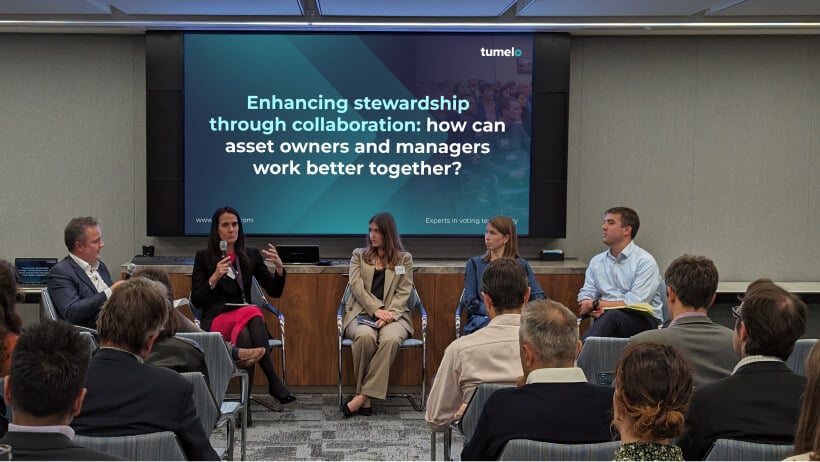Expert panel: How asset owners and managers can work better together

In September Tumelo had the pleasure of hosting a networking evening for the investment industry's leading stewardship figures.
The event started with a panel discussion hosted by Tumelo's Head of Sales, Charlie Barlow, titled: Collaboration in stewardship: how can asset owners and fund managers work better together?
The panelists were:
1. Hilkka Komulainen, Head of Responsible Investment, Aegon UK
2. Will Martindale, Co-founder and Managing Director, Canbury Insights
3. Valeria Piani, Head of Stewardship, Phoenix Group
4. Siobhan Archer, Global Stewardship Lead, LGT Wealth Management
Here are some of the key insights from the discussion.
Collaboration leads to positive outcomes
Effective collaboration requires parties to share a common goal, and Siobhan Archer, Global Stewardship Lead at LGT Wealth Management, ensures this by sending out DDQs [due-diligence questionnaires] to LGT's asset managers. She explained: "It allows me to start analysing where our asset managers are at from a voting and sustainability perspective."
At Phoenix Group, Head of Stewardship Valeria Piani ensures that the firm's external managers are held to account on those shared goals.
"We believed one of our asset managers was conservative when voting at company AGMs, and we had many conversations to understand their reasoning. In the next year, we actually noticed an increase of votes against management — a success in influencing corporate practices."
The need for more "nuanced" reporting
Aegon has recently become a signatory to the UK Stewardship Code, a membership which carries with it significant reporting demands. However, Aegon's Head of Responsible Investment, Hilkka Komulainen, raised a desire for asset managers to provide more illuminating data that cuts through surface-level information.
"The kind of voting and engagement reporting I get at the moment doesn't give me the nuance to make informed decisions or properly assess the value add of managers’ stewardship activities, and actually doesn't give managers who are engaging well the credit that they are due," she said.
Will Martindale, Co-founder and Managing Director, Canbury Insights, echoed Hilkka's comments. He added that some motivated asset owners were blocked from pursuing sustainability goals due to a lack of "connectivity between what the asset owners would like to achieve and what they're being offered by managers".
Martindale also pointed to the need for parallel reporting duties, such as Implementation Statements and Stewardship Code reporting, to be consolidated to ease the paperwork burden on the industry.
Understanding engagement better
For Phoenix, its focus is not on replicating the research and engagement that asset managers are already doing, but to be able to meaningfully discuss those efforts with them. Understanding how engagement actually works is key to doing this, which is why Phoenix is conducting its own thematic engagements. Piani explained, "We've looked at customer feedback, stakeholder materiality assessments, and collaborative engagement efforts, to determine what our priorities should be."
Client-directed voting is on everyone's agenda — in some form

Each of the panelists are at different stages of exploring and using client-directed voting, giving attendees valuable insight into how their approach to voting is evolving and the motivating factors behind this. But ultimately, the underlying theme was clear: how can asset owners take increased ownership of voting in the best interests of clients and beneficiaries?
Aegon prioritises a client-informed approach. It delegates voting to its asset managers while also providing an "expression of wish" on resolutions its responsible investment team identify as significant. On the other hand, LGT believes that directly voting on its passively managed funds through pass-through voting will have greater impact, quicker.
Piani from Phoenix offered advice to asset owners wanting to have greater voting choice: voting is not to be taken lightly. She explained, "[Voting] involves research, money, and engagement. If an asset owner wants to have greater control over their voting, they need to have the resources for it. Otherwise, they should make sure that assessment of voting practices by managers is a core element of their selection and monitoring processes."
Despite that, Martindale stressed that asset owners are increasingly eager to align voting with their broader stewardship commitments. Pointing to an asset-owner focus group he conducted, he said that asset owners struggled to reconcile the lack of voting power with the overall responsible-investing narrative that they are championing. Client-directed voting, he suggested, could help square that circle.
Conclusion
The panel discussion demonstrated that client-directed voting is high on the agenda for many asset owners. This is driven by a number of factors, including; increased client interest in stewardship, regulatory pressure and an awareness that asset managers are often voting at odds with each other and/or the clients they represent. Positively, asset managers and asset owners that attended were motivated to improve collaboration, transparency and engagement to ensure better stewardship outcomes.
Thank you to all who attended our networking event, especially the panelists for their brilliant contributions to this fast-changing topic.